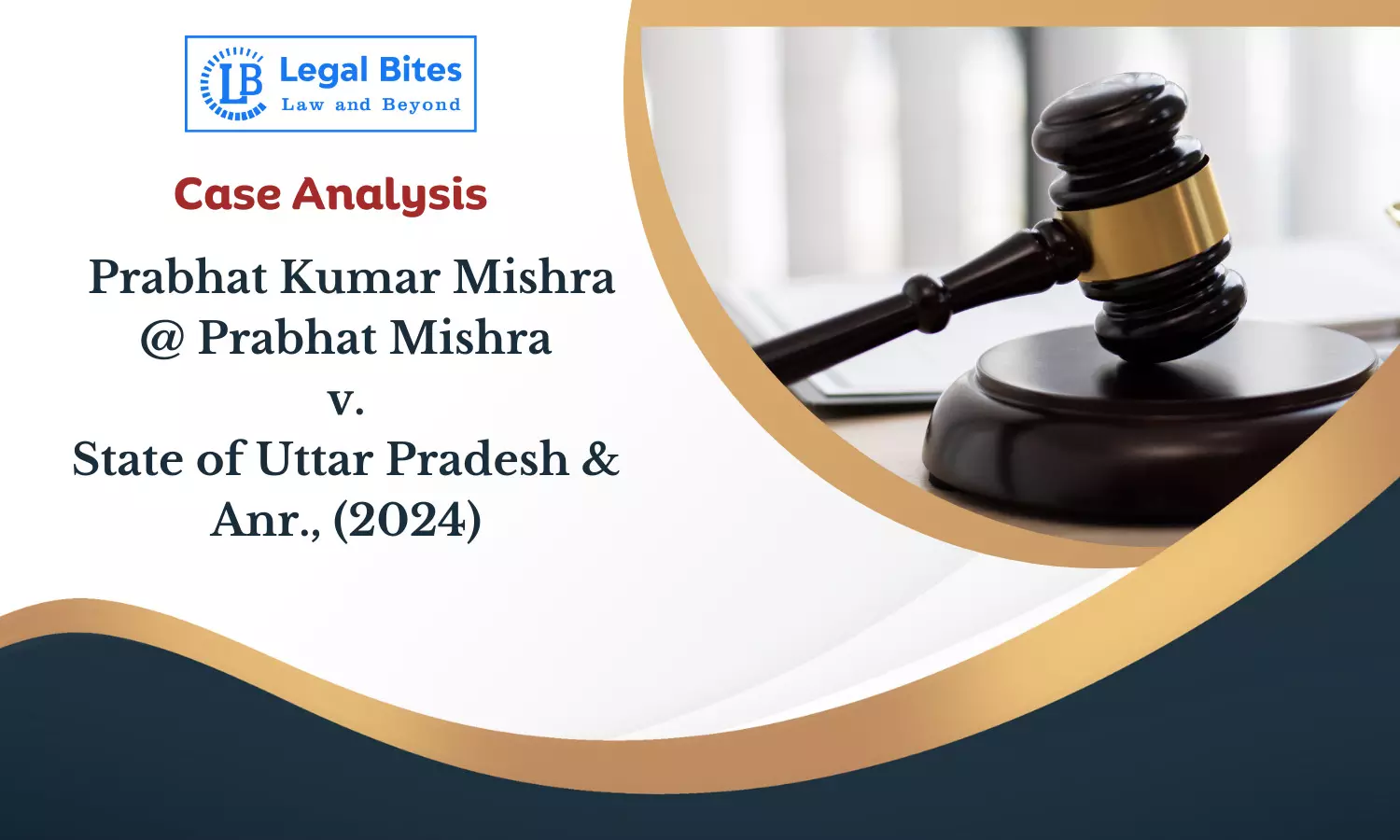Case Analysis: Prabhat Kumar Mishra @ Prabhat Mishra v. State of U.P. & Anr. (2024) | Abetment of Suicide
The apex court dismissed the caste-based discrimination charges citing insufficient evidence and emphasized the necessity of clear mens rea for abetment.

The Supreme Court dismissed the caste-based discrimination charges citing insufficient evidence and emphasized the necessity of clear mens rea for abetment. Ultimately, it concluded that the charges constituted an abuse of the legal process.
Case Title: Prabhat Kumar Mishra @ Prabhat Mishra v. State of Uttar Pradesh & Anr.
Court: Supreme Court of India
Citation: Arising out of SLP(Crl.) No(s). 9591 of 2022
Judges: Justice B.R. Gavai and Justice Sandeep Mehta
Date of Decision: 5th March, 2024
Facts
The present case is an appeal against the judgment passed by the Allahabad High Court which rejected the application filed by the present appellant u/s 482 CrPC.
The application was filed before the High Court to quash the criminal proceeding against him before CJM, Farrukhabad for offences u/s 306 IPC and Section 3(2)(v) of the Scheduled Castes and the Scheduled Tribes (Prevention of Atrocities) Act, 1989. The case was related to abetment of suicide under which a criminal case was filed against the appellant.
The main evidence which led to the filing of the case against the appellant was a suicide note which was found by the Investigating Officer in which the appellant had been made. It is important to note that the suicide note was the only foundation for the filing of the charge sheet. Thus, the appellant approached the Allahabad High Court to quash the criminal case against him under Section 482. The application was rejected vide order dated 26th July 2022 which is challenged in this appeal.
Issue
Whether the institution of the criminal case against the appellant is valid and legal by provisions of IPC for an offence and Section 3(2)(v) of the SC/ST Act.
Laws Applied
The laws applied in the case include Section 3(2)(v) of the Scheduled Caste and Scheduled Tribe Act and Section 306 of the Indian Penal Code, 1860.
Arguments
Appellant
The learned senior counsel for the appellant stated that even if the allegations as set out in the suicide note are taken to be true on their face value, the same do not constitute the necessary ingredients of the offences alleged and hence, it is a fit case wherein the charge-sheet deserves. The counsel, also stated that the only aspect which can be concluded from the suicide note is that the deceased was frustrated and bothered by the style of functioning of the appellant herein and of Shashidhar Dwivedi, CDO, and thus he felt that he was left with no option but to end his life. This cannot be interpreted to mean that the appellant was responsible for directly abetting or instigating the suicide.
Respondent
The learned standing counsel for the State of Uttar Pradesh on the other hand stated that there has been a rampant increase in the number of cases reported whereby senior officials get involved in actions which result in harassment of the public. In this case, as well it was proven by the suicide note that the deceased had rather been a victim of the harassment and humiliation by the said appellant and that the same led him to commit suicide.
The counsel also argued that all the necessary components for abetment to suicide have been fulfilled by the suicide note and thus there is no reason to conclude that the suicide note is not sufficient grounds for instituting a criminal case against the appellant.
Judgment
The court stated:
“prosecution of the appellant herein for the offence under Section 3(2)(v) of the SC/ST Act is ex facie illegal and unwarranted because it is nowhere the case of the prosecution in the entire charge-sheet that the offence under IPC was committed by the appellant upon the deceased based on his caste.”
The court while deciding the case took into consideration certain case laws as mentioned below:
i. Masumsha Hasanasha Musalman v. State of Maharashtra, (2000) 3 SCC 557
The court held:
“To attract the provisions of Section 3(2)(v) of the Act, the sine qua non is that the victim should be a person who belongs to a Scheduled Caste or a Scheduled Tribe and that the offence under the Penal Code, 1860 is committed against him on the basis that such a person belongs to a Scheduled Caste or a Scheduled Tribe. In the absence of such ingredients, no offence under Section 3(2)(v) of the Act arises.”
Thus, the court held that in the present case, it was missed by both the Trial Court and the High Court that this aspect has to be assessed before conviction under the said Act. The conviction ought to be set aside.
ii. Netai Dutta v. State of W.B., (2005) 2 SCC 659
This case was also similar to the present case and a suicide note had been found similarly. The court had set aside the conviction because there was no conclusive proof that the deceased had committed suicide because of the accused only. The mere presence of a suicide note would not account for conclusive evidence.
iii. M. Mohan v. State represented by the Deputy Superintendent of Police, (2011) 3 SCC 626
In this case, the court highlighted that: “Abetment involves a mental process of instigating a person or intentionally aiding a person in doing a thing. Without a positive act on the part of the accused to instigate or aid in committing suicide, conviction cannot be sustained.”
Conclusion
Thus, on the grounds of the above cases and reliance on the available factual scenarios, it was concluded by the court that the order of the High Court and all proceedings against the appellant in the present criminal case involving him for abetment to suicide u/s 306 IPC and Section 3(2)(v) of SC/ST Act are quashed. This case helps us understand how the application of law must be correct to achieve the objective and motive of legislation behind introducing the said law in the first place.
The proper interpretation is necessary to prevent the conviction of any innocent person merely because he can be brought within the ambit of a widely misinterpreted law. While abetment to suicide is an offence under IPC, the same requires a high degree of influence and involvement of the accused to prove that he was responsible for making the deceased believe that there was no option apart from taking his own life. The appeal in this case was thereby allowed.
Click Here to Read the Complete Judgment

